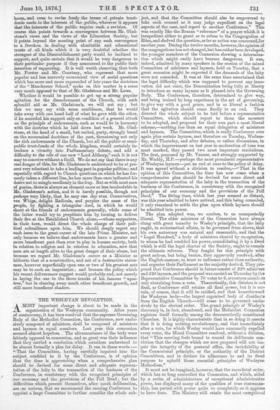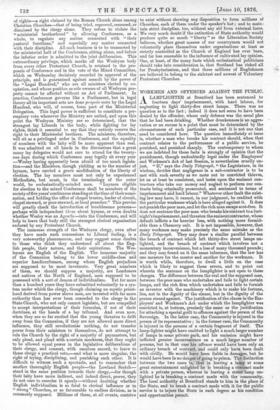THE WESLEYAN REVOLUTION.
AMOST important change is about to be made in the organisation of the Wesleyan community. After years of controversy, it has been resolved that the supreme Governing Body of the Methodist Connexion, the Conference, now exclu- sively composed of ministers, shall be composed of ministers and laymen in equal numbers. Last year this concession seemed almost hopeless. The ultramontanes of the body were bitterly opposed to concession, and so great was their influence that they carried a resolution which outsiders understood to be almost formally a plea for delay. It ran in these words :— " That the Committee, having carefully inquired into the subject confided to it by the Conference, is of opinion that the time is approaching when a comprehensive plan should be devised for some direct and adequate represen- tation of the laity in the transaction of the business of the Conference, in consistency with the recognised principles of our economy and the provisions of the Poll Deed ; but the difficulties which present themselves, after much deliberation, are so serious, that we recommend the ensuing Conference to appoint a large Committee to further consider the whole sub-
ject, and that the Committee should also be empowered to • take such counsel as it may judge expedient on the legal aspects of the case, and report to another Conference." This was exactly like the Roman "reference" of a prayer which it is inexpedient either to grant or to refuse to the Congregation of Rites, and shelved the question, as far as action was concerned, for another year. During the twelve months, however, the opinion of the congregations has not changed, but has rather been developed, the younger members of the Connexion showing a determina- tion which might easily have become dangerous. It was, indeed, admitted by many speakers in the session of the mixed Committee of ministers and laymen, held on Tuesday, that a great secession might be expected if the demands of the laity were not conceded. It was at the same time ascertained that the legal difficulty which was supposed to prevent any inno- vation did not exist, the Denomination being fully at liberty to introduce as many laymen as it pleased into the Governing Body. The Conference, therefore, determined to give way, and being trained by long experience in the art of governing, to give way with a good grace, and in so liberal a fashion that the agitation should come finally to an end. They directed the whole subject to be laid before a representative Committee, which should report to them the measure to be adopted, and proposed for their own part a most liberal scheme,—nothing less than an equal delegation of ministers and laymen. The Committee, which is really Conference over again plus certain laymen, met therefore on Tuesday, Wednes- day, and Thursday, and after debates, or rather discussions, in which the improvement on last year in moderation of tone was most marked, they passed two most important resolutions. The first, proposed by Mr. Vanner, and strongly supported by Mr. Waddy, M.P.—perhaps the most prominent representative of Wesleyan laymen—put an end at once to the policy of delay. It was agreed without a division to resolve,—" That in the opinion of this Committee, the time has now come when a comprehensive plan should be devised for some direct and adequate representation of the laity in the transaction of the business of the Conference, in consistency with the recognised principles of our economy and the provisions of the Poll Deed." The fitting time, which last year seemed so distant, was this year admitted to have arrived, and this being conceded, it only remained to settle the plan upon which laymen should be admitted into power.
The plan adopted was, we confess, to us unexpectedly liberal. The older ministers of the Connexion have always clung with great tenacity to Wesley's principle, that the laity ought, in ecclesiastical affairs, to be governed from above, that his own autocracy was natural and reasonable, and that the "Legal Hundred," a body of ministers elected by co-optation, to whom he had confided his power, consolidating it by a Deed which is still the legal charter of the Society, ought to remain the ultimate referees. They fought for this principle with great ardour, but being beaten, they apparently resolved, after the English manner, to trust to influence rather than authority, and organise their Parliament as the majority desired. They pro- posed that Conference should in future consist of 220 ministers and 220 laymen, and the proposal was carried on Thursday by the Representative Committee by 70 votes to 6, seventeen raembcrs only abstaining from a vote. Theoretically, this division is nct final, as Conference still retains all final power, but it is cer- tain, of course, that it will be ratified, and that henceforward the Wesleyan body—the largest organised body of dissidents from the English Church—will cease to be governed exclu- sively by the clerical order. The grand principle of Wesley's theocracy is, in fact, abandoned, and the Methodist Connexion registers itself formally among the democratically constituted Churches. It is highly characteristic that in so doing it asserts that it is doing nothing revolutionary, and that immediately after a vote, for which Wesley would have summarily expelled every voter, the Mixed Committee resolved, without a division, that "This meeting feels bound to record its deliberate con- viction that the changes which are now proposed will not im- pair the integrity of the pastoral office, the inviolability of the Connexional principle, or the authority of the District Committees, and to declare its adherence to and its fixed purpose to uphold those essential principles of Wesleyan Methodism."
It must not be imagined, however, that the sacerdotal order, which has so long controlled the Connexion, and which, aided by a series of administrators of exceptional administrative power, has displayed many of the qualities of true statesman- ship, has parted with power quite so completely as it appears to have done. The Ministry still retain the most exceptional of rights—a right claimed by the Roman Church alone among Christian Churches—that of being tried, reproved, censured, or dismissed by the clergy alone. They refuse to violate the "ministerial brotherhood" by allowing Conference, as a whole, to regulate any matter connected with "their pastoral functions," and especially any matter connected with their discipline. All such business is to be transacted by the ministerial half of the Conference, sitting alone, and before the inferior order is admitted to the joint deliberation. This extraordinary privilege, which marks off the Wesleyan body from every other Protestant Church, is retained in the pro- posals of Conference and in the vote of the Mixed Committee, which on Wednesday decisively recorded its approval of the principle, and is guaranteed against assault by the power of the "Legal Hundred," who are all ministers elected by co- optation, and whose position as sole owners of all Wesleyan pro- perty cannot be affected without an Act of Parliament. In practice, Conference governs like a Parliament, but in legal theory all its important acts are done proprio motu by the Legal Hundred, who will, of course, form part of the Ministerial Delegation. This legal power is sufficient to constitute a per- emptory veto whenever the Ministry are united, and upon this point the Wesleyan Ministry are so determined, that the strongest lay Liberals in the body, while fighting for lay rights, think it essential to say that they entirely reserve the right to their Ministerial brethren. The ministers, therefore, will sit as a privileged order in Conference, and the equality of numbers with the laity will be more apparent than real. It was admitted on all hands in the discussions that a great many lay delegates would not care to attend for the twenty- one days during which Conference may legally sit every year —Wesley having apparently been afraid of too much legisla- tion—and the Ministers, though yielding as to the number of laymen, have carried a grave modification of the liberty of election. The lay members must not only be experienced Methodists, but must, in the terminology of the outer world, be ecclesiastically-minded men. "Laymen eligible for election to the mixed Conference shall be members of the society of five years' continuous standing at the time of their nomi- nation, and holding the office of chapel trustee, leader of circuit, chapel steward, or poor steward, or local preacher." This proviso will greatly check the introduction of troublesome persons— perhaps with independent ideas about hymns, or even doubts whether Wesley was an Apostle—into the Conference, and will help to leave that body still the strongest clerical organisation endured by any Protestant Church.
The immense strength of the Wesleyan clergy, even after they have made such concessions to Liberal feeling, is a very noteworthy phenomenon, and may suggest some doubts to those who think they understand all about the Eng- lish people, their nature, and their aspirations. The Wes- leyans are English of the English. The immense majority of the Connexion belong to the lower middle-class and superior handicraftsmen, among whom English prejudices are supposed to be most inveterate. Very great numbers of them, we should suppose a majority, are Londoners and natives of the North of England, men supposed to be possessed with a sort of demon of individualism. Yet for more than a hundred years they have submitted voluntarily to a sys- tem under which the clergy, though claiming no mystic priest- hood derived from power above men, are invested with far more authority than has ever been conceded to the clergy in the State Church, who not only cannot legislate, but are compelled to accept interpretations of their formulas, if not of their doctrines, at the hands of a lay tribunal. And even now, when they are so far excited that the young threaten to drift away from the Connexion, if they are not allowed more direct influence, they still revolutionise nothing, do not transfer power from their ministers to themselves, do not attempt to rule the Church by the right of a majority of paymasters, but only plead, and plead with a certain meekness, that they ought to be allowed equal power in the legislative deliberations of their clergy, and consent, with emulous accord, to leave to those clergy a practical veto,—and what is more singular, the right of trying, disciplining, and punishing each other. It is difficult to witness such a spectacle, and to remember that another thoroughly English people—the Lowland Scotch— stand in the same position towards their clergy,—for though their laity have more indirect, and indeed direct, power, they do not care to exercise it openly—without doubting whether English individualism is so fatal to clerical influence or to " strong " Churches, or so favourable to endless division, as is commonly supposed. Millions of them, at all events, contrive to exist without showing any disposition to form millions of Churches, each of them under the speaker's hat ; and to main- tain strict discipline, too, without any aid from external force. We very much doubt if the extinction of State authority would produce quite so much " liberty " as the Liberation Society believes, whether great masses of our countrymen would not voluntarily place themselves under organisations at least as strictly controlled as the Church of England has ever been, and far less amenable to the influence of cultivated lay opinion. One, at least, of the many facts which ecclesiastical politicians should take into consideration is, that Scotland has risked all for Presbyterianism, and that three millions of Englishmen are believed to belong to the strictest and newest of Voluntary Protestant Churches.































 Previous page
Previous page